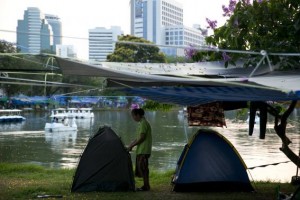By Amy Sawitta Lefevre

Credit: Reuters/Darren Whiteside
BANGKOK Wed Apr 9, 2014 5:54pm EDT
(Reuters) – Two months ago, Piyavadee Boonmak was living comfortably at home. But she quit her job as a civil servant and now works as a volunteer cleaning toilets at Lumpini Park, the new focal point of anti-government protests in the Thai capital.
Piyavadee now lives in a khaki tent in the central Bangkok park, once a haven for joggers but now a temporary home for more than 10,000 supporters of a movement that has been trying for five months to oust Prime Minister Yingluck Shinawatra.
Their aim is also to rid Thailand of the influence of her billionaire brother, ousted former premier Thaksin Shinawatra.
“Everyone has to do their part,” said Piyavadee, 50, who spends her days cleaning the park’s portable toilets. “We’re like one big family. We’re all here for the same reason: to get rid of that lying, cheating bastard, Thaksin.”
The protesters took over Lumpini Park last month after moving blockades that had clogged Bangkok intersections, a tactical retreat they said was to “give Bangkok back”.
Yingluck remains in office, albeit as head of a weakened caretaker government, despite the best efforts of protesters that included huge street rallies, sit-ins at state offices and a promise to disrupt a February 2 election.
Piyavadee’s humble new job is a good sign that the People’s Democratic Reform Committee (PDRC), as the main anti-government group is known, is in it for the long haul. They have set up six “villages” in the park, equipped with showers, portable toilets, washing machines, a medical centre and even a part-time school.
To keep unwanted guests out, there are 2,300 weather-beaten security volunteers from far-flung provinces who take turns in manning checkpoints and rummaging through bags for guns and other contraband. If trouble breaks out, a rapid deployment team of “elite guards” is available, too.
The PDRC says the rules for its on-duty muscle are simple: No alcohol, no drugs.
“People from all over the country are camped in this park. We’re an example that Thais can live together harmoniously,” said Thaworn Senniem, a protest leader who heads PDRC security. “But with so many people under one roof issues are bound to crop up, which is why we have security guards.”
Things are not always as rosy as protest leaders might suggest. Twenty-four people have been killed and scores wounded since the protests began, some in clashes with security forces and others in mysterious bombings and shootings.
PADDLE BOATS AND JOGGERS
The signs that once pointed the way to Lumpini’s tennis courts and paddle boats have been replaced by a new one at the western entrance that makes clear the PDRC is in charge.
Thailand has been locked in a bitter political conflict since a coup ousted Thaksin in 2006. He now lives abroad to avoid a graft conviction he says was politically motivated, but parties he controls have won every election since 2001.
His supporters – mainly from the populous rural north and northeast – say he was persecuted by a jealous elite and middle class in Bangkok. The PDRC and other critics accuse Thaksin of overseeing an era of unbridled corruption and nepotism.
After weeks of street action without major results, the protesters in Lumpini say victory is near. They are banking on any one of a number of legal challenges against Yingluck that could finish her off within weeks.
While they wait, the Lumpini Park villagers are making the most of the nightly entertainment put on for them.
“People get very stressed listening to protest speeches all day so it’s crucial we offer some light entertainment,” said Akanat Promphan, a protest movement spokesman.
Folk music blares from the main protest stage and a cross-dressing performer steps up to dance. There are hoots from the crowd as some sway their hips to a well-known song about the hardships of working-class Thais.
Not everyone is happy that the protesters have moved into the park, with nearby residents complaining about the noise. But the protesters say they’ll pack up and leave when they win.
“Besides, we always make way for the joggers,” Thaworn said.
Those living in the park are mostly from Thailand’s poorest provinces, although the anti-government movement is largely backed by Bangkok’s middle-classes.
“I’m a silent backer, dropping by from time to time,” said Methenee Jitsomsak, a 49-year-old housewife decked out in jewels. “Would I live here? No. It’s much too hot.”
There was a similar carnival-like mood in 2010 when pro-Thaksin “red shirts” rallied just a few minutes’ walk from the park against what they said was an illegitimate government.
Their protest was cut short when Suthep Thaugsuban, the current PDRC leader who was then a deputy prime minister, sent in troops to break up the red-shirt rally.
More than 90 people were killed in the crackdown.
Suthep faces murder charges for giving that order in 2010, but the Lumpini protesters see him as a rock star.
“We wake up and go to sleep to the sound of Suthep,” said Chada Limptapong, 70, who sits in front of her tent selling odds-and-ends including betel nut for 60 baht ($1.84).
The village has its problems, despite the image of harmony protest leaders like to project, and some of the guards have been accused of rowdy behavior.
Volunteer toilet cleaner Piyavadee said she’s concerned about her 18-year-old daughter, who shares her tent. “I tell her to walk back before dark,” she said. “Some of the guards can’t control themselves.”
(Additional reporting by Jutarat Skulpichetrat; Editing by Martin Petty and Paul Tait)







